monish
AH elite
Robert Ruark (1915-1965) an American author, a syndicated columnist and an avid hunter, who fell in love with Africa which was evident in his writings...
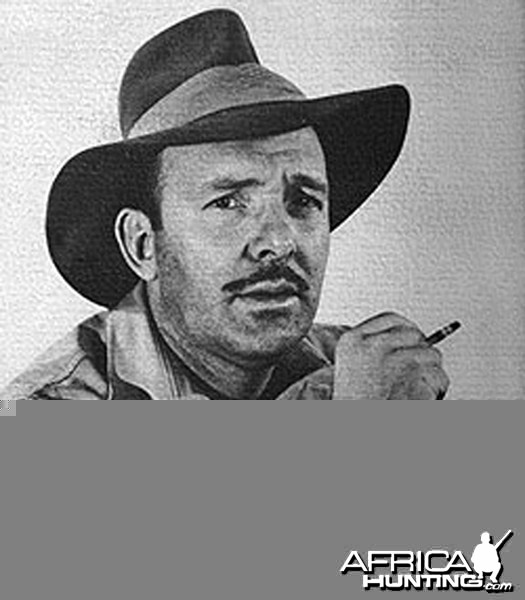
Robert Ruark (1915-1965)
His early life
Born Robert C. Ruark, Jr., to Charlotte A. Ruark and Robert C. Ruark, a bookkeeper for a wholesale grocery, young Ruark attended local schools and graduated from New Hanover High School in Wilmington, North Carolina. He graduated from high school at age 12 and entered the University of North Carolina at age 15. The Ruark family was deeply affected by the Depression,but despite his families' financial travails, he earned a journalism degree from the University of North Carolina at Chapel Hill. In the 1930s he was fired from an accounting job in the Works Progress Administration and did a hitch in the United States Merchant Marine. Ruark worked for two small town newspapers in North Carolina, the Hamlet News Messenger and later the Sanford Herald. Ruark had an adoptive brother named David, about whom little is known.
In 1936 he moved to Washington, D.C., and was hired as a copy boy for the The Washington Daily News, a Scripps-Howard newspaper. In just a few months he was the paper's top sports reporter. During World War II Ruark was commissioned an ensign in the United States Navy. Ruark served ten months as a gunnery officer on Atlantic and Mediterranean convoys.
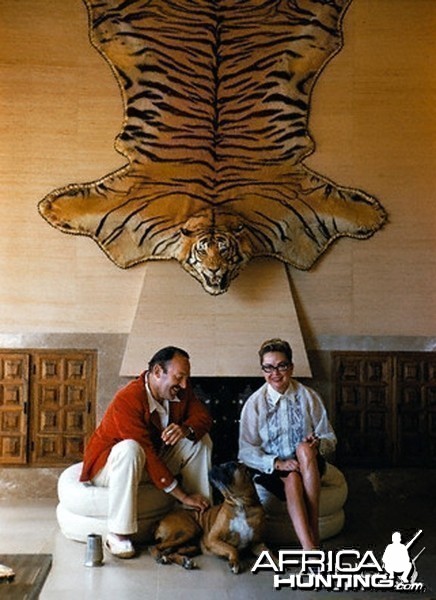
Novelist and essayist Robert Ruark sits with his wife, Virginia, and their dog at home in their living room below a stretched tiger pelt.
His Writings
Upon his return to Washington, Ruark joined the Scripps-Howard Newspaper Alliance. As the New York Times said, Ruark was "sometimes glad, sometimes sad, and often mad--but almost always provocative." Some of his columns were eventually collected into two books, I Didn't Know It Was Loaded (1948) and One for the Road (1949).
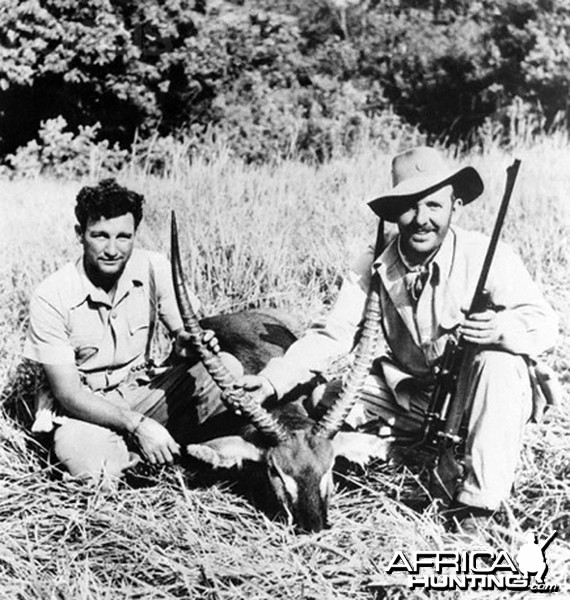
Author and columnist Robert C. Ruark (right) and his guide, famed African hunter Harry Selby, inspect the Tanganyikan waterbuck Ruark bagged on a African safari. Ruark's travels in the dark continent are soon to be seen in the RKO-Pathe film "African Adventure."
As he grew in notoriety, Ruark began to write fiction; first for literary magazines, and then his first novel, Grenadine Etching in 1947. The novel parodied the popular historical romances of time and set the stage for his many humorous novels and articles published in the Saturday Evening Post, Esquire, and other popular publications.
In 1953, Ruark began writing a series for Field & Stream magazine entitled The Old Man and the Boy. Considered largely autobiographical (although technically fiction), this heartwarming series ran until late 1961. Many of the articles in the series were collected into a book of the same name, followed shortly thereafter by another companion book entitled The Old Man's Boy Grows Older. The stories were punctuated by the philosophical musings of the Old Man, who was a character modeled after both of Ruark's grandfathers, though based mostly on Ned Adkins, Ruark's maternal grandfather. In the stories, young Bob Ruark grows up hunting and fishing in coastal North Carolina, always guided by the Old Man. However, the pain of his parents' difficult domestic life and his relatively few childhood friends - Ruark, something of a child prodigy in school, was a loner - are tellingly absent from the stories. Today these two books are his best remembered works; his other novels are long out of print.
Ruark's first bestselling novel was published in 1955. It was entitled Something of Value and was about the Mau Mau Uprising by Kenyan rebels against the British rule. The novel drew from the author's personal knowledge and experiences on safari in Africa and was adapted into a successful 1957 film, Something of Value. Later [1962], Ruark delivered Uhuru, a continuing and similar theme, but not intended to be a sequel. "Uhuru" is the Swahili word for freedom. He had intended to write a final chapter in the series with the working title of A Long View From a Tall Hill, but this never materialized.
His African safaris
After he began to gain success as a writer, Ruark decided that it was time to fulfill a lifelong dream to go on safari to Africa. Legendary Ker and Downey Safaris booked him with Harry Selby, and Ruark began a love affair with Africa. It is interesting to note that Ruark was booked with Selby because of a desire to use a tracker named Kidogo, who had hunted with Ernest Hemingway on an earlier safari. Ruark's pairing with Selby, though fortuitous, was merely luck. Kidogo was a member of Selby's crew.
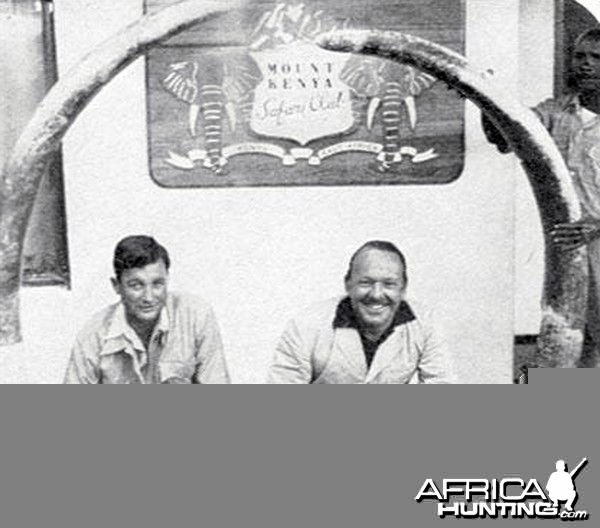
Harry Selby (left) and Robert Ruark (right) with a great pair of Elephant tusks, photographed at the Mount Kenya Safari Club near Nanyuki, Kenya.
As a result of this first safari, Ruark wrote a book called Horn of the Hunter, in which he detailed his hunt. Selby became an overnight legend and was subsequently booked for up to five years in advance by Americans wishing to duplicate Ruark's adventures. After the first safari, Selby and Ruark again went out hunting, and this time they took cameras along. The result was a one hour documentary entitled Africa Adventure, released by RKO pictures. Though extremely difficult to find, a 16mm print of this movie was discovered in around 2002 and a DVD copy was created and donated to the Robert Ruark Foundation in Southport, North Carolina.
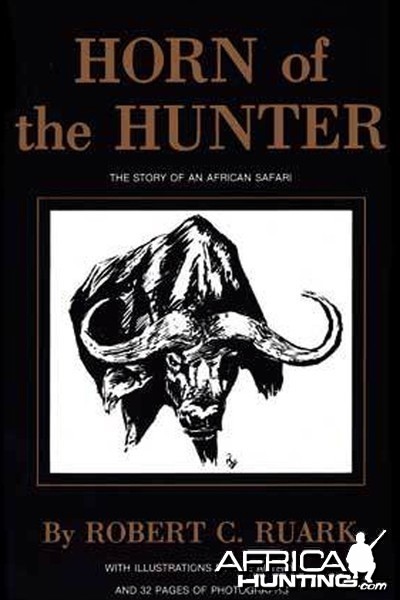
Horn of The Hunter, The Story of an African Safari by Robert Ruark. In the early 1950s famous newspaper columnist Robert Ruark and his wife, Virginia, went to British East Africa (now Kenya and Tanzania) for a nine-week safari with their professional hunter Harry Selby. The three of them, along with a group of native runners, a Jeep, and an old lorry, ventured into the bush for an adventure none of them soon forgot—and neither will you! In this book Ruark shares with you the ferocity of the wounded buffalo and the acid sweat of fear-no other book will give you the "feel" of Africa like this one can. This is what one of our readers had to say: “If you’ve ever dreamed of going on a safari in Africa, but don’t have the money or the gumption, this is about as close as you’ll come to the real thing. Ruark was a journalist, author, and big-game hunter who wrote from the late 40s until his death in the mid 60s. He was hugely popular during his lifetime, but now has been almost totally forgotten... This book contains Ruark’s own tale of his first safari in Africa in the early 1950s and is an incredibly entertaining and detailed account of safaris... Ruark discusses the regular comings and goings of the safari, but he talks about a wide range of other topics including his experiences in WWII in the merchant marine, Hollywood safari movies, the habits of various game animals in Africa, a bit about the diverse natives, and a host of other topics. It really is as if you are sitting with Ruark at the end of a hard day hunting enjoying a cocktail around the campfire, this is a must own/must read.
After his first half dozen books or so, Ruark continued to write, though few of his subsequent novels surpassed his early successes. Ruark moved to Palamos, Spain in 1960 after a bittersweet visit to his hometown of Wilmington, North Carolina. On leaving the U.S., he wrote (according to humorist and author Allan Sherman in his book The Rape of the A*P*E) a scathing farewell note to America, which appeared in Playboy and was titled "Nothing Works and Nobody Cares." He died in London, England on July 1, 1965 most likely as a result of alcoholism. His last novel, The Honey Badger, exemplified the personal condition of the author at this time in his life. Indeed, this book was published posthumously, as was Use Enough Gun, which is essentially a collection of segments from his earlier works. More notable are the two collections published by McIntosh and Casada, both of which are quite representative of Ruark's finest work.
In 1938 Ruark married Virginia Webb, an interior designer from an upper middle-class family in the Washington, D.C. area and a graduate of Georgetown University. Married for over 20 years, they had no children and divorced in 1963. Virginia Webb-Ruark died in 1966.
Robert Ruark is buried in Palamos, Spain.
After Ruark’s premature death (his greatest pleasures in life were drinking and making love and he couldn’t give up drinking) this intensely interesting and complicated man did not pass into oblivion. His popular novels were often reprinted. But his newspaper columns, which so often and so accurately predicted what would happen in Africa when European powers engineered independence for their colonies were completely overlooked. Very simply, he stated that “When you change a man’s way of life you had better have something of value with which to replace it”.

Robert Ruark (1915-1965), journalist, author, world traveler, sportsman, and syndicated columnist, this novelist was known as a "poor man's Hemingway".
Books
• Grenadine Etching (1947)
• I Didn't Know It Was Loaded (1949)
• One for the Road (1949)
• Grenadine's Spawn (1952)
• Horn of the Hunter (1953)
• Something of Value (1955)
• The Old Man and the Boy (1957)
• Poor No More (1959)
• The Old Man's Boy Grows Older (1961)
• Uhuru (1962)
• The Honey Badger (1965)
• Use Enough Gun: On Hunting Big Game (1966)
• Women (1967)
• Robert Ruark's Africa by Michael McIntosh (1991), collection of Ruark's magazine articles
• The Lost Classics by Robert Ruark (1996), additional hunting adventures
Also:
• A View from a Tall Hill: Robert Ruark in Africa by Terry Wieland (2004); despite the title, this is a biography of Ruark's whole life and writings
• Someone of Value: A Biography of Robert Ruark by Hugh Foster
• Ruark Remembered: By the Man Who Knew Him Best by Alan Ritchie (October 2007)

Robert Ruark's African Safari by Robert Ruark. If ever a time and place have had a profound effect upon a man, that time was the 1950s, the place was Africa, and the man was Robert Ruark. It was in Africa that the author of The Old Man and the Boy and The Old Man's Boy Grows Older finally grew up. There the author of Horn of the Hunter and Use Enough Gun finally came to grips with himself, came to realize his very essence and the measure of his being.
When Ruark hunted in Africa, the Dark Continent reverberated with the last echoes of a great and passing age. Ruark found Africa to be anything but dark, for it was there that he finally found enlightenment and a measure of contentment for his troubled soul.
Just as Africa changed Robert Ruark, Ruark watched firsthand as Africa changed itself. That was, of course, the time of the bloody Mau Mau Emergency where terror held an entire nation captive, but it was also a time of changing political climates, uncontrolled poaching, and open warfare that left a hunter, seeking solitude, little to enjoy. Through it all, he never hesitated to speak his mind or express his heart.
Robert Ruark's Africa spans the years from his first safari, when Horn of the Hunter was born, to a story published just two months before he died. These stories, originally published in magazines as diverse as Playboy and Reader’s Digest now appear for the first time in book form, presented with special permission from Ruark's estate, and chosen for what they reveal of Ruark both as a writer and a man.
In them, you'll meet Ruark's heroes, the white hunters; you'll walk with Ruark in the tracks of Karamojo Bell, carrying Bell's favorite .275 rifle across the same African wilderness that the famous ivory hunter once trod; you'll see the atrocities of the Mau Mau; face down a charging elephant; and feel the warmth of a sundowner after hunting buffalo from dawn to dusk.
Film
• "Africa Adventure" (1955-56), narrator, writer, and director
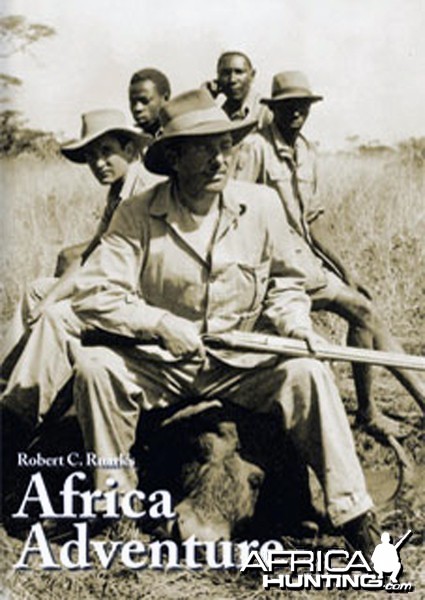
This movie by Robert Ruark, Africa Adventures, made in 1954 and narrated by Robert Ruark himself, gives a picture of safari hunting in British East Africa (BEA) at the time of the Mau Mau Emergency. Ruark arrives in BEA via Cairo and Addis Ababa in an Ethiopian Airlines propeller plane. Noteworthy is the fact that a passenger departs the plane with a rifle in hand! There’s a lot to be said for a simpler time without terrorists and terrorism!
Once in Nairobi, Ruark and his wife, Virginia, meet with Harry Selby and Jack Block, the owner of Kerr & Downey, to plan their safari. At Harry Selby’s advise Andrew Holmberg was hired by Ruark to protect and maneuver the cameraman in the right positions so the best possible film could be made. Soon the party is off with a few trucks and a crew of twenty natives, heading toward the NFD. Early on it becomes obvious to the viewer that the safaris of old where long, drawn-out affairs. Ruark’s safari goes from Northern Kenya to Uganda to Tanzania and then back to Kenya, and while the film does not say how long this all took, two months is a fair estimate. Ruark and Selby look for a large tusker in the Liasames/Merille area and they succeed in finding a 110-pounder that is shot on camera. Thereafter, around Isiolo, the safari looks for a black rhino; a charge and kill are shown on camera.
The safari moves to Uganda next, but the hunters have no luck there, so it is off to Masailand where John Sutton replaces Andrew Holmberg. Here we get to see what safari life was like. We see the mobile tent safaris of old that were entirely self sufficient and even bread was baked in the bush. Virginia and Robert Ruark shoot sand grouse and then look for a large buffalo. RR brings home a whopper of no less than 49 inches in spread. Finally Selby, Sutton, and RR bait for a leopard that they manage to get. All in all, four members of the Big Five are shot on camera.
Monish
Robert Ruark (1915-1965)
His early life
Born Robert C. Ruark, Jr., to Charlotte A. Ruark and Robert C. Ruark, a bookkeeper for a wholesale grocery, young Ruark attended local schools and graduated from New Hanover High School in Wilmington, North Carolina. He graduated from high school at age 12 and entered the University of North Carolina at age 15. The Ruark family was deeply affected by the Depression,but despite his families' financial travails, he earned a journalism degree from the University of North Carolina at Chapel Hill. In the 1930s he was fired from an accounting job in the Works Progress Administration and did a hitch in the United States Merchant Marine. Ruark worked for two small town newspapers in North Carolina, the Hamlet News Messenger and later the Sanford Herald. Ruark had an adoptive brother named David, about whom little is known.
In 1936 he moved to Washington, D.C., and was hired as a copy boy for the The Washington Daily News, a Scripps-Howard newspaper. In just a few months he was the paper's top sports reporter. During World War II Ruark was commissioned an ensign in the United States Navy. Ruark served ten months as a gunnery officer on Atlantic and Mediterranean convoys.
Novelist and essayist Robert Ruark sits with his wife, Virginia, and their dog at home in their living room below a stretched tiger pelt.
His Writings
Upon his return to Washington, Ruark joined the Scripps-Howard Newspaper Alliance. As the New York Times said, Ruark was "sometimes glad, sometimes sad, and often mad--but almost always provocative." Some of his columns were eventually collected into two books, I Didn't Know It Was Loaded (1948) and One for the Road (1949).
Author and columnist Robert C. Ruark (right) and his guide, famed African hunter Harry Selby, inspect the Tanganyikan waterbuck Ruark bagged on a African safari. Ruark's travels in the dark continent are soon to be seen in the RKO-Pathe film "African Adventure."
As he grew in notoriety, Ruark began to write fiction; first for literary magazines, and then his first novel, Grenadine Etching in 1947. The novel parodied the popular historical romances of time and set the stage for his many humorous novels and articles published in the Saturday Evening Post, Esquire, and other popular publications.
In 1953, Ruark began writing a series for Field & Stream magazine entitled The Old Man and the Boy. Considered largely autobiographical (although technically fiction), this heartwarming series ran until late 1961. Many of the articles in the series were collected into a book of the same name, followed shortly thereafter by another companion book entitled The Old Man's Boy Grows Older. The stories were punctuated by the philosophical musings of the Old Man, who was a character modeled after both of Ruark's grandfathers, though based mostly on Ned Adkins, Ruark's maternal grandfather. In the stories, young Bob Ruark grows up hunting and fishing in coastal North Carolina, always guided by the Old Man. However, the pain of his parents' difficult domestic life and his relatively few childhood friends - Ruark, something of a child prodigy in school, was a loner - are tellingly absent from the stories. Today these two books are his best remembered works; his other novels are long out of print.
Ruark's first bestselling novel was published in 1955. It was entitled Something of Value and was about the Mau Mau Uprising by Kenyan rebels against the British rule. The novel drew from the author's personal knowledge and experiences on safari in Africa and was adapted into a successful 1957 film, Something of Value. Later [1962], Ruark delivered Uhuru, a continuing and similar theme, but not intended to be a sequel. "Uhuru" is the Swahili word for freedom. He had intended to write a final chapter in the series with the working title of A Long View From a Tall Hill, but this never materialized.
His African safaris
After he began to gain success as a writer, Ruark decided that it was time to fulfill a lifelong dream to go on safari to Africa. Legendary Ker and Downey Safaris booked him with Harry Selby, and Ruark began a love affair with Africa. It is interesting to note that Ruark was booked with Selby because of a desire to use a tracker named Kidogo, who had hunted with Ernest Hemingway on an earlier safari. Ruark's pairing with Selby, though fortuitous, was merely luck. Kidogo was a member of Selby's crew.
Harry Selby (left) and Robert Ruark (right) with a great pair of Elephant tusks, photographed at the Mount Kenya Safari Club near Nanyuki, Kenya.
As a result of this first safari, Ruark wrote a book called Horn of the Hunter, in which he detailed his hunt. Selby became an overnight legend and was subsequently booked for up to five years in advance by Americans wishing to duplicate Ruark's adventures. After the first safari, Selby and Ruark again went out hunting, and this time they took cameras along. The result was a one hour documentary entitled Africa Adventure, released by RKO pictures. Though extremely difficult to find, a 16mm print of this movie was discovered in around 2002 and a DVD copy was created and donated to the Robert Ruark Foundation in Southport, North Carolina.
Horn of The Hunter, The Story of an African Safari by Robert Ruark. In the early 1950s famous newspaper columnist Robert Ruark and his wife, Virginia, went to British East Africa (now Kenya and Tanzania) for a nine-week safari with their professional hunter Harry Selby. The three of them, along with a group of native runners, a Jeep, and an old lorry, ventured into the bush for an adventure none of them soon forgot—and neither will you! In this book Ruark shares with you the ferocity of the wounded buffalo and the acid sweat of fear-no other book will give you the "feel" of Africa like this one can. This is what one of our readers had to say: “If you’ve ever dreamed of going on a safari in Africa, but don’t have the money or the gumption, this is about as close as you’ll come to the real thing. Ruark was a journalist, author, and big-game hunter who wrote from the late 40s until his death in the mid 60s. He was hugely popular during his lifetime, but now has been almost totally forgotten... This book contains Ruark’s own tale of his first safari in Africa in the early 1950s and is an incredibly entertaining and detailed account of safaris... Ruark discusses the regular comings and goings of the safari, but he talks about a wide range of other topics including his experiences in WWII in the merchant marine, Hollywood safari movies, the habits of various game animals in Africa, a bit about the diverse natives, and a host of other topics. It really is as if you are sitting with Ruark at the end of a hard day hunting enjoying a cocktail around the campfire, this is a must own/must read.
After his first half dozen books or so, Ruark continued to write, though few of his subsequent novels surpassed his early successes. Ruark moved to Palamos, Spain in 1960 after a bittersweet visit to his hometown of Wilmington, North Carolina. On leaving the U.S., he wrote (according to humorist and author Allan Sherman in his book The Rape of the A*P*E) a scathing farewell note to America, which appeared in Playboy and was titled "Nothing Works and Nobody Cares." He died in London, England on July 1, 1965 most likely as a result of alcoholism. His last novel, The Honey Badger, exemplified the personal condition of the author at this time in his life. Indeed, this book was published posthumously, as was Use Enough Gun, which is essentially a collection of segments from his earlier works. More notable are the two collections published by McIntosh and Casada, both of which are quite representative of Ruark's finest work.
In 1938 Ruark married Virginia Webb, an interior designer from an upper middle-class family in the Washington, D.C. area and a graduate of Georgetown University. Married for over 20 years, they had no children and divorced in 1963. Virginia Webb-Ruark died in 1966.
Robert Ruark is buried in Palamos, Spain.
After Ruark’s premature death (his greatest pleasures in life were drinking and making love and he couldn’t give up drinking) this intensely interesting and complicated man did not pass into oblivion. His popular novels were often reprinted. But his newspaper columns, which so often and so accurately predicted what would happen in Africa when European powers engineered independence for their colonies were completely overlooked. Very simply, he stated that “When you change a man’s way of life you had better have something of value with which to replace it”.
Robert Ruark (1915-1965), journalist, author, world traveler, sportsman, and syndicated columnist, this novelist was known as a "poor man's Hemingway".
Books
• Grenadine Etching (1947)
• I Didn't Know It Was Loaded (1949)
• One for the Road (1949)
• Grenadine's Spawn (1952)
• Horn of the Hunter (1953)
• Something of Value (1955)
• The Old Man and the Boy (1957)
• Poor No More (1959)
• The Old Man's Boy Grows Older (1961)
• Uhuru (1962)
• The Honey Badger (1965)
• Use Enough Gun: On Hunting Big Game (1966)
• Women (1967)
• Robert Ruark's Africa by Michael McIntosh (1991), collection of Ruark's magazine articles
• The Lost Classics by Robert Ruark (1996), additional hunting adventures
Also:
• A View from a Tall Hill: Robert Ruark in Africa by Terry Wieland (2004); despite the title, this is a biography of Ruark's whole life and writings
• Someone of Value: A Biography of Robert Ruark by Hugh Foster
• Ruark Remembered: By the Man Who Knew Him Best by Alan Ritchie (October 2007)
Robert Ruark's African Safari by Robert Ruark. If ever a time and place have had a profound effect upon a man, that time was the 1950s, the place was Africa, and the man was Robert Ruark. It was in Africa that the author of The Old Man and the Boy and The Old Man's Boy Grows Older finally grew up. There the author of Horn of the Hunter and Use Enough Gun finally came to grips with himself, came to realize his very essence and the measure of his being.
When Ruark hunted in Africa, the Dark Continent reverberated with the last echoes of a great and passing age. Ruark found Africa to be anything but dark, for it was there that he finally found enlightenment and a measure of contentment for his troubled soul.
Just as Africa changed Robert Ruark, Ruark watched firsthand as Africa changed itself. That was, of course, the time of the bloody Mau Mau Emergency where terror held an entire nation captive, but it was also a time of changing political climates, uncontrolled poaching, and open warfare that left a hunter, seeking solitude, little to enjoy. Through it all, he never hesitated to speak his mind or express his heart.
Robert Ruark's Africa spans the years from his first safari, when Horn of the Hunter was born, to a story published just two months before he died. These stories, originally published in magazines as diverse as Playboy and Reader’s Digest now appear for the first time in book form, presented with special permission from Ruark's estate, and chosen for what they reveal of Ruark both as a writer and a man.
In them, you'll meet Ruark's heroes, the white hunters; you'll walk with Ruark in the tracks of Karamojo Bell, carrying Bell's favorite .275 rifle across the same African wilderness that the famous ivory hunter once trod; you'll see the atrocities of the Mau Mau; face down a charging elephant; and feel the warmth of a sundowner after hunting buffalo from dawn to dusk.
Film
• "Africa Adventure" (1955-56), narrator, writer, and director
This movie by Robert Ruark, Africa Adventures, made in 1954 and narrated by Robert Ruark himself, gives a picture of safari hunting in British East Africa (BEA) at the time of the Mau Mau Emergency. Ruark arrives in BEA via Cairo and Addis Ababa in an Ethiopian Airlines propeller plane. Noteworthy is the fact that a passenger departs the plane with a rifle in hand! There’s a lot to be said for a simpler time without terrorists and terrorism!
Once in Nairobi, Ruark and his wife, Virginia, meet with Harry Selby and Jack Block, the owner of Kerr & Downey, to plan their safari. At Harry Selby’s advise Andrew Holmberg was hired by Ruark to protect and maneuver the cameraman in the right positions so the best possible film could be made. Soon the party is off with a few trucks and a crew of twenty natives, heading toward the NFD. Early on it becomes obvious to the viewer that the safaris of old where long, drawn-out affairs. Ruark’s safari goes from Northern Kenya to Uganda to Tanzania and then back to Kenya, and while the film does not say how long this all took, two months is a fair estimate. Ruark and Selby look for a large tusker in the Liasames/Merille area and they succeed in finding a 110-pounder that is shot on camera. Thereafter, around Isiolo, the safari looks for a black rhino; a charge and kill are shown on camera.
The safari moves to Uganda next, but the hunters have no luck there, so it is off to Masailand where John Sutton replaces Andrew Holmberg. Here we get to see what safari life was like. We see the mobile tent safaris of old that were entirely self sufficient and even bread was baked in the bush. Virginia and Robert Ruark shoot sand grouse and then look for a large buffalo. RR brings home a whopper of no less than 49 inches in spread. Finally Selby, Sutton, and RR bait for a leopard that they manage to get. All in all, four members of the Big Five are shot on camera.
Monish
Last edited by a moderator:


